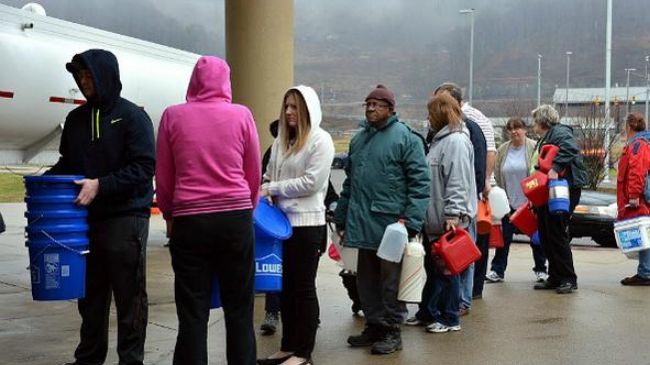West Virginia chemical spill ignored

If we called West Virginia 4-methylcyclohexane-methanol leak “Watergate”, do you think the political press would pay more attention?
Hours of cable news time and thousands of words have been spent in search of what “Bridgegate” means for Chris Christie. An equal and opposite amount of energy has been poured into an examination of what the Christie situation means for Obama.
Meanwhile, in West Virginia, there are 300,000 people without useable water, and an unknown number who may fall ill because the warning to avoid the tainted supply came seven hours after the leak was discovered – and perhaps weeks after it happened. (Neighbors of the plant have told reporters they detected the chemical’s odor in December.)
Complaining about desperate news coverage is to call foul on a game that is actually just playing by a different set of rules. I know that. I know, too, that there’s no organized conspiracy, nor even any vague ill will, involved in how it came to be that Bridgegate continues to attract punditry while West Virginia only generates the kind of sympathetic-if-distant coverage we usually grant far-off and not too devastating natural disasters.
Bridgegate is just sexier; it features big personalities and a bold storyline. It gives reporters a chance to show off a range of pop culture references (The Sopranos, Bruce, assorted other Twitticisms!). It is taking place in the literal backyard of most national political reporters. It has very little to do with policy, or numbers, or science. Perhaps best of all, to opine about Bridgegate is to engage in a punditry wager with little or no cost, since 2016 is so very far away. Write that it’s the end of Christie’s career! Write that he’ll be fine! No one is keeping score (truth be told, even when people keep score in punditry, nothing bad happens to the losers).
Journalists can further excuse their myopia about the lane closure controversy with the notion that they’re just giving the public what they want. The story is “breaking through” because everyone can identify with those poor stuck commuters: “Traffic is a huge deal,” as one writer put it. That may be the case, but don’t even more people drink water?
I shouldn’t be too hard on journalists, though. On the surface, the West Virginia spill just isn’t as interesting or dynamic as revenge conspiracy. It’s a single event with an obvious bad guy (the deliciously-named “Freedom Industries”).
There’s no compelling narrative, no unfolding drama, no whodunit to solve, and catastrophic environmental destruction in West Virginia, on an even larger scale than the nine counties affected by the spill, is old news. The state harvested its entire 10m acres of virgin forest between 1870 and 1920. In the past 50 years, mountaintop-removal mining has made over 300,000 acres of unfit for economically productive use, and the clean water supply has been systematically reduced by 20% in the last 25.
I suspect there’s a more subtle yet uglier motivation in how the New Jersey story beguiles us even as West Virginia toxifies.
Bridgegate as we understand it right now in no way asks us to take a look at our own lives or behavior. The questions people have about the Fort Lee lane closures take as a given that people should be able to drive to and from work minimal interference; we want to get to the bottom of “why the traffic was held up for hours?” but not, “Why are there so many people driving?”
That people identify with the drivers (“that could happen to me”) and see the West Virginia chemical draught as a merely a terrible misfortune (“those poor folks”) illustrates why dust-ups like Bridgegate decide elections but environmental issues continue to lag far behind as an issue voters care about, despite the growing urgency to combat climate change. We can personalize a scandal, but the effects of environmental damage happen to other people – the people of West Virginia, to be specific.
Because make no mistake: our country’s national habits are at the heart of West Virginia’s regional tragedy – perhaps even this specific one. We don’t get much coal from West Virginia anymore, it’s true – because a century of steady consumption stripped the state almost bare. (There are West Virginia mines that have been continuously excavated for over 120 years.) As coal production has shifted away from the Appalachians to Wyoming and the plains, West Virginia politicians have become increasingly desperate to make their state as attractive as possible to industry. In that context, that state authorities knew about Freedom Industries’ massive stockpile of MCMH as long ago as last year and did nothing about it makes sense.
Compared to the systematic devastation of an entire region’s environment, “Time for some traffic problems in Fort Lee” seems like the petty feud that it was. But my real hope isn’t that we shift our focus from New Jersey to West Virginia, it’s that people realize that both are scandals, and both are environmental policy stories. And they both speak to the costs of letting shortsighted, local economy goals trump more global concerns.
The traffic on the George Washington Bridge is, in part, as bad as it is because of the antiquated rail service between New York and New Jersey. The system needs the exact sort of overhaul that Christie scuttled as one of his first acts in office. And if you thought that New York bureaucrats hated the traffic Christie’s cronies caused, well, they hated the congestion pricing that Bloomberg threatened to bring about in his first term even more. (Just last November, New York Governor Cuomo dismissed the idea again.) One sure way to foil traffic vigilantes of the future, after all, would be to deny them a hostage.







